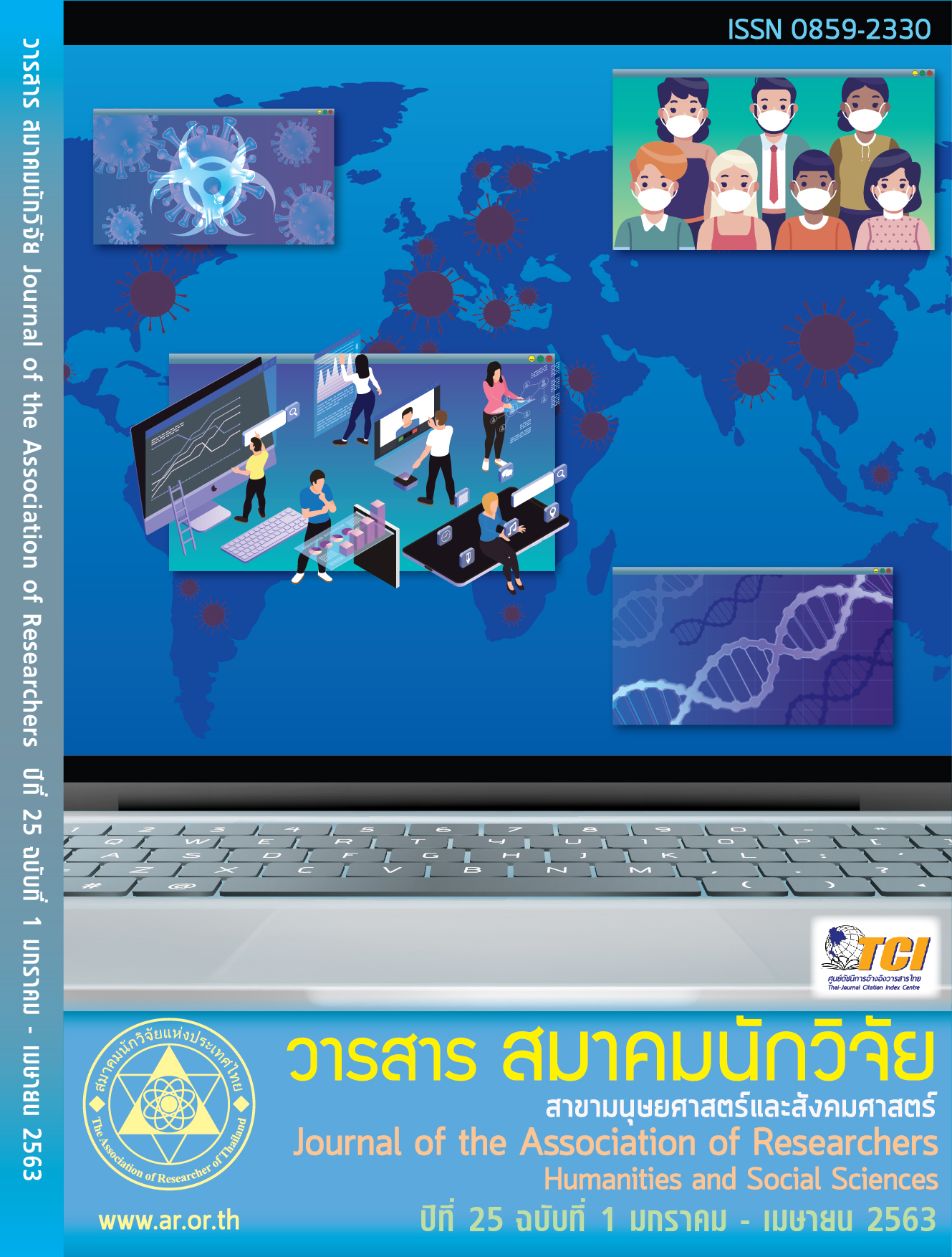The Development of knowledge management system for Research Utilization
Main Article Content
Abstract
The objective of this research was to develop knowledge management system for research utilization for public organization and private organization. The research key informants divided into two groups. The first group consisted of 27 experts, leaders and personnel from seven research administrative network organizations and stakeholders. The research instrument was focus group questions. The second key informants were 15 experts in research KM field, administrators and personnel working in seven research administrative network organizations. The research findings revealed that a KM for research utilization components included: 1) personnel from research organization; researchers or research users, 2) information technology, and 3) communication. There were six steps within a system: 1) knowledge creating for target needs, 2) communicating with researchers and research user, 3) transferring research knowledge for utilization, 4) knowledge sharing among researchers and users, 5) supporting, enhancing, pushing and pulling for research utilization, and 6) reviewing and evaluating research utilization process.
Article Details
บทความที่ปรากฏในวารสารนี้ เป็นความรับผิดชอบของผู้เขียน ซึ่งสมาคมนักวิจัยไม่จำเป็นต้องเห็นด้วยเสมอไป การนำเสนอผลงานวิจัยและบทความในวารสารนี้ไปเผยแพร่สามารถกระทำได้ โดยระบุแหล่งอ้างอิงจาก "วารสารสมาคมนักวิจัย"
References
คณะกรรมการวิจัยแห่งชาติ, สำนักงาน. (2554). นโยบายและยุทธศาสตร์การวิจัยของชาติ ฉบับที่ 8 พ.ศ. 2555-2559 (ออนไลน์). แหล่งที่มา: http://www1.nrct.go.th/downloads/ps/55/08/strategy8/01_nayo.pdf (2557, พฤษจิกายน 15).
ทิพย์สุดา จันทร์แจ่มหล้า. (2552). รายงานการวิจัย เรื่องโมเดลความสัมพันธ์เชิงสาเหตุของการนำผลวิจัยไปใช้ประโยชน์ในการทำงานของอาจารย์มหาวิทยาลัย. กรุงเทพมหานคร: มหาวิทยาลัยธรรมศาสตร์.
ศิโรจน์ ผลพันธิน. (2547). รายงานการวิจัยเรื่อง รูปแบบการบริหารงานวิจัยของสถาบันอุดมศึกษา. คณะครุศาสตร์ มหาวิทยาลัยราชภัฏสวนดุสิต.
ศิวะพร ภู่พันธ์. (2554). การศึกษาและทดสอบปัจจัยเชิงสาเหตุของการใช้ประโยชน์งานวิจัยของอาจารย์มหาวิทยาลัย: การวิจัยแบบผสมวิธี. วิทยานิพนธ์ปริญญาดุษฎีบัณฑิต, สาขาวิชาวิธีวิทยาการวิจัยการศึกษา คณะครุศาสตร์ จุฬาลงกรณ์มหาวิทยาลัย.
อุไรวรรณ วิจารณกุล. (2550). ระบบการจัดการงานวิจัยเพื่อพัฒนาวิสาหกิจชุมชนของมหาวิทยาลัยราชภัฏพิบูล สงคราม. พิษณุโลก: มหาวิทยาลัย ราชภัฏพิบูลสงคราม
Amara, N., Ouimet, M., & Landry, R. (2004). New evidence on instrumental, conceptual, and symbolic utilization of university research in government agencies. Science Communication, 26, 75-106.
Canadian Institutes of Health Research (2007). About knowledge translation. Focus Technical Brief, 18, 1-8.
Graham, I.D., Logan, J., Harrison, M.B., Straus, S.E., Tetroe, J., and Caswell, W., et al. (2006). Lost in knowledge translation: Time for a map? The Journal of Continuing Education in the Health Professions, 26, 13-24.
Harris, A., Kuruvilla, S., & Borchert, M. (2004). Bridging the implementation gap between knowledge and action for health. Bulletin of the World health Organization, 82(10), 724-731.
Hemsley-Brown, J.V. (2004). Facilitating research utilization: a cross sector review of the research evidence. International Journal of Public Sector Management. 17(6), 534-553.
Hird, J.A. (2005). Policy analysis for what? The effectiveness of nonpartisan policy research organizations. Policy Studies Journal, 33(1), 83-105.
Jacobson, N., Butterill, D., & Goering, P. (2003). Development of a framework for knowledge translation: Understanding user context. Journal of Health Services Research & Policy, 8, 94-99.
Kakabadse, N.K., and Kakabadse. A. (2003). Reviewing the knowledge management literature: Towards a taxonomy. Journal of Knowledge Management, 7(4), 75-91.
Landry, R., Amara, N. & Lamari, M. (2001). Utilization of social science research knowledge in Canada. Research Policy, 30, 333-349.
Levin, B. (2011). Theory, research and practice in mobilizing research knowledge in education. London Review of Education, 9(1), 15-26.
Mooney, C.Z. (1991). Information sources in state legislative decision making. Legislative Studies Quarterly, 16, 445-455.
Neison, S. (2001). IDRC supported research and its influence on public policy: Knowledge utilization and public policy process: A Literature review. Ottawa, Canada: International Development Research Center.
Ness, E.C. (2010). The role of information in the policy process: Implications for the examination of research utilization in higher education policy. In J.C. Smart (ed.), Higher Education: Handbook of Theory and Research, 25, 1-49.
Ness, E.C., & Mistretta, M.A. (2009). Policy adoption in North Carolina and Tennessee: A comparative case study of lottery beneficiary program. Review of Higher Education, 32(4), 489-514.
Nutley, S.M., Walter, I., & Davies, H.T.O. (2007). Using evidence: How research can inform public services. Bristol: The Policy Press.
Poynder, R. (1998). Getting to the Nuts and Bolts of Knowledge Management. Information World Review, 135(135), 20.
Rogers, S. (1994). Performance Management in Local Government. Essex: Longmans.
Swan, J., Newell, S., Scarbrough, H., and Hislop, D. (1999). Knowledge management and intervention: Networks and networking. Journal of Knowledge Management, 3(4), 262-275.
Sudsawad, P. (2007). Knowledge translation: Introduction to models, strategies, and measures. Austin, TX: Southwest Educational Development laboratory, National Center for the Dissemination of Disability Research.
Thompson, D.S., Estabrooks, C.A., Scott-Findlay, S., Moore, K., and Wallin, L. (2007). Interventions aimed at increasing research use in nursing: a systematic review. Implementation Science, 15, 1-16.
Weiss, C.H. (1980). Knowledge creep and decision accretion. Knowledge: Creation, Diffusion, Utilization, 1, 381-404.
Translated Thai References
The Thailand Research Fund. (2014). Research Utilization. Bangkok: The Thailand Research Fund.
The office of the National Research Council of Thailand. (2012). The Eighth National Research policy and Strategy (2012-2016) (Online). Retrieved from: http://www1.nrct.go.th/ downloads/ps/55/08/strategy8/01_nayo.pdf (2014, November 15).
Tipsuda Janjamlha. (2009). Causal Relationship Model of Research Utilization in Performance of University Instructors. Bangkok: Thammasat University.
Siroj Pholpunthin. (2004). Model of Research management of Higher Education: Suan Dusit Rajabhat University. Bangkok: Faculty of Education, Suan Dusit Rajabhat University.
Siwaporn Poopan. (2011). An Exploration and Test of Casual Factors of Research Utilization of University Faculty Members: Mixed Method Research. Dissertation of Educational Research and Psychology, Faculty of Education, Chulalongkorn University.
Uriwan Vijaranakul. (2007). Research Management System for Community Enterprise Development of Phibun Rajabhat University. Phitsanulok: Pibulsongkram Rajabhat University.


